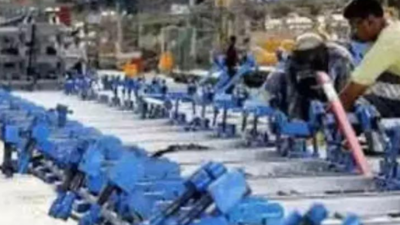Top Searches
- News
- City News
- gurgaon News
- As manufacturing picks up, factory accidents in Gurugram and Faridabad see a 54% jump: Report
As manufacturing picks up, factory accidents in Gurugram and Faridabad see a 54% jump: Report

Image used for representational purpose
GURUGRAM: Factory accidents in Gurugram and Faridabad increased by 54% in 2021-22 compared to the previous year, according to a report by Safe In India Foundation, which studies mishaps that cause serious injuries to workers on shop floors of automobile manufacturers and their supply chains.
In its latest report of the series, the total number of factory accidents that left workers with severe injuries (amputations) increased from 521 in 2020-21 to 803 in 2021-22.
The number of accidents rose in line with how manufacturing activity increased after the peak pandemic years of 2020 and 2021. The figures are still lower than the pre-pandemic period (before 2020).
“The figures for factory accidents in our latest report have increased since last year primarily because there was an artificial dip in total accidents during the pandemic. In 2020 and the first half of 2021, the lockdown and subsequent fall in production led to curtailed operations of factories. But as the factory operations returned to pre-pandemic levels, accidents also shot up,” Sandeep Sachdeva, SII co-founder and CEO, said on Monday.
Nevertheless, the data underscored the need for factories in the automobile industry to improve safety measures. Power presses, the report said, accounted for over 50% of the total accidents. The trend was similar in the years before.
The latest survey found that migrant workers, who form the bulk of the workforce in the manufacturing sector, bore the brunt of accidents. Around 91% of those who had to undergo amputation were migrants, mostly from Bihar, Odisha and UP, with little education and low wages. Of them, 68% were non-permanent employees, making legal protection inaccessible to many of them.
The key reasons for accidents, according to the survey, were inadequate inspections and training in supply chains. Fatigue, too, played a major role. In the 2021-22 period, about half of the injured workers surveyed in Haryana told SII that their daily shift timings exceeded 12 hours, and they were not paid for logging in overtime.
To remedy the causes, SII has suggested some measures to auto manufacturers and original equipment manufacturers (OEMs).
“A joint platform was recently created with the OEMs and the Haryana labour department. As a result, about 30 audits have been conducted in a transparent manner. Additionally, manufacturers like Maruti are taking steps to improve safety standards. But a lot more needs to be done,” Sachdeva said.
Auto industry sources said on Monday that SII’s findings had led to changes for the better over the years. “Many OEMs and supply chains have been increasing their accident-free days. Going ahead, we need collaborative efforts from all the stakeholders,” said Vinnie Mehta, director-general, the Automotive Component Manufacturers Association of India (ACMA).
Some industry insiders also said that OEMs alone cannot shoulder the burden of making production accident-free. “There needs to be greater effort from the government. A joint forum can come up with measures such as certification like we have for crash-safety of cars,” a source said.
Asked, a senior officer in the Haryana labour department said the government has stepped up inspection drives and is organising awareness programmes.
“We have thousands of factories in Gurugram, Faridabad region. Depending on our workforce, we are able to conduct 10 inspections a month. Our priority is a complete inspection of all hazardous factories in a year, big non-hazardous factories in three years, and small and micro factories in five years,” the officer, who is in the industry safety and health (ISH) wing of the department, said.
Maruti Suzuki, India’s biggest carmaker which has its largest manufacturing plant in Manesar, said it has a committee supervised by senior officials who also monitor safety systems.
“Over the years, the company has collaborated with 500 of our Tier-1 suppliers to improve their shop floor safety… We found that 70% of the shop floor accidents occurred at Tier-2 and Tier-3 suppliers and 61% of these were in press and molding shops. A special drive was undertaken, and as a result, more than 4,360 press machines and over 1,980 molding machines were upgraded with safety features," said Rahul Bharti, executive officer (corporate affairs), Maruti Suzuki.
In its latest report of the series, the total number of factory accidents that left workers with severe injuries (amputations) increased from 521 in 2020-21 to 803 in 2021-22.
The number of accidents rose in line with how manufacturing activity increased after the peak pandemic years of 2020 and 2021. The figures are still lower than the pre-pandemic period (before 2020).
“The figures for factory accidents in our latest report have increased since last year primarily because there was an artificial dip in total accidents during the pandemic. In 2020 and the first half of 2021, the lockdown and subsequent fall in production led to curtailed operations of factories. But as the factory operations returned to pre-pandemic levels, accidents also shot up,” Sandeep Sachdeva, SII co-founder and CEO, said on Monday.
Nevertheless, the data underscored the need for factories in the automobile industry to improve safety measures. Power presses, the report said, accounted for over 50% of the total accidents. The trend was similar in the years before.
The latest survey found that migrant workers, who form the bulk of the workforce in the manufacturing sector, bore the brunt of accidents. Around 91% of those who had to undergo amputation were migrants, mostly from Bihar, Odisha and UP, with little education and low wages. Of them, 68% were non-permanent employees, making legal protection inaccessible to many of them.
The key reasons for accidents, according to the survey, were inadequate inspections and training in supply chains. Fatigue, too, played a major role. In the 2021-22 period, about half of the injured workers surveyed in Haryana told SII that their daily shift timings exceeded 12 hours, and they were not paid for logging in overtime.
To remedy the causes, SII has suggested some measures to auto manufacturers and original equipment manufacturers (OEMs).
“A joint platform was recently created with the OEMs and the Haryana labour department. As a result, about 30 audits have been conducted in a transparent manner. Additionally, manufacturers like Maruti are taking steps to improve safety standards. But a lot more needs to be done,” Sachdeva said.
Auto industry sources said on Monday that SII’s findings had led to changes for the better over the years. “Many OEMs and supply chains have been increasing their accident-free days. Going ahead, we need collaborative efforts from all the stakeholders,” said Vinnie Mehta, director-general, the Automotive Component Manufacturers Association of India (ACMA).
Some industry insiders also said that OEMs alone cannot shoulder the burden of making production accident-free. “There needs to be greater effort from the government. A joint forum can come up with measures such as certification like we have for crash-safety of cars,” a source said.
Asked, a senior officer in the Haryana labour department said the government has stepped up inspection drives and is organising awareness programmes.
“We have thousands of factories in Gurugram, Faridabad region. Depending on our workforce, we are able to conduct 10 inspections a month. Our priority is a complete inspection of all hazardous factories in a year, big non-hazardous factories in three years, and small and micro factories in five years,” the officer, who is in the industry safety and health (ISH) wing of the department, said.
Maruti Suzuki, India’s biggest carmaker which has its largest manufacturing plant in Manesar, said it has a committee supervised by senior officials who also monitor safety systems.
“Over the years, the company has collaborated with 500 of our Tier-1 suppliers to improve their shop floor safety… We found that 70% of the shop floor accidents occurred at Tier-2 and Tier-3 suppliers and 61% of these were in press and molding shops. A special drive was undertaken, and as a result, more than 4,360 press machines and over 1,980 molding machines were upgraded with safety features," said Rahul Bharti, executive officer (corporate affairs), Maruti Suzuki.
FOLLOW US ON SOCIAL MEDIA
FacebookTwitterInstagramKOO APPYOUTUBE
Start a Conversation
end of article









